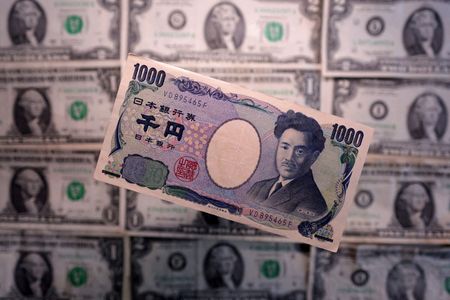By Stephen Culp
NEW YORK (Reuters) – Wall Street and European stocks rallied and U.S. Treasury yields surged on Friday as investor risk appetite was strengthened by a strong employment report and signs China is open to tariff negotiations.
All three major U.S. stock indexes advanced more than 1% on the session, with economically sensitive financials, transports and microchips outperforming the broader market.
All three indexes advanced on the week.
The S&P 500 posted its ninth consecutive session of gains, its longest winning streak in over two decades.
The U.S. economy added more jobs than expected last month and wage inflation came in below consensus, according to the Labor Department, prompting a jump in benchmark U.S. Treasury yields.
“There was really not anything not to like about the jobs data; it indicates that the economy is doing just fine,” said Paul Nolte, senior wealth adviser and market strategist at Murphy & Sylvest in Elmhurst, Illinois. “There are still discussions about the impacts of tariffs, but so far at least, that data has not shown up in a lot of the numbers.”
Beijing is evaluating Washington’s offer to hold talks over U.S. President Donald Trump’s crushing tariffs, China’s Commerce Ministry said, signaling a potential de-escalation of the market-rattling trade war.
“China and the U.S. are both taking slow but repeated steps toward negotiation and reconciliation,” Jed Ellerbroek, portfolio manager at Argent Capital Management in St. Louis. “It seems the spiraling-out-of-control phase ended.”
“The market does not believe that the current tariff rates are going to persist for very long,” Ellerbroek added.
Lack of clarity regarding U.S.-China trade duties has contributed to a marked deterioration in U.S. businesses’ long-term outlooks, the latest round of quarterly earnings results has shown.
Apple and Amazon.com reported quarterly earnings late on Thursday with disappointing forecasts, including Apple’s estimated $900 million in tariff costs. The reports took some wind from the sails of the so-called Magnificent Seven group of artificial intelligence-related megacap stocks, which had enjoyed a rebound this week.
General Motors warned of a $4 billion-$5 billion hit to earnings and American Airlines withdrew profit forecasts.
The Dow Jones Industrial Average rose 564.47 points, or 1.39%, to 41,317.43, the S&P 500 rose 82.49 points, or 1.47%, to 5,686.63 and the Nasdaq Composite rose 266.99 points, or 1.51%, to 17,977.73.
European shares surged, closing the book on a busy earnings week as revived hopes of Sino-U.S. trade negotiations and solid employment data stoked investor optimism.
MSCI’s gauge of stocks across the globe rose 13.23 points, or 1.58%, to 848.38.
The pan-European STOXX 600 index rose 1.67%, while Europe’s broad FTSEurofirst 300 index rose 36.55 points, or 1.75%.
Emerging market stocks rose 23.83 points, or 2.14%, to 1,135.80. MSCI’s broadest index of Asia-Pacific shares outside Japan closed higher by 2.44%, to 595.08, while Japan’s Nikkei rose 378.39 points, or 1.04%, to 36,830.69.
Treasury yields rose as the strong employment data led investors to pare bets on a Federal Reserve rate cut in June.
The yield on benchmark U.S. 10-year notes rose 7.7 basis points to 4.308%, from 4.231% late on Thursday.
The 30-year bond yield rose 5.2 basis points to 4.7889% from 4.737% late on Thursday.
The 2-year note yield, which typically moves in step with interest rate expectations for the Federal Reserve, rose 12.5 basis points to 3.826%, from 3.701% late on Thursday.
The dollar dipped in the wake of the upbeat U.S. jobs report.
The dollar index, which measures the greenback against a basket of currencies including the yen and the euro, fell 0.14% to 100.00, with the euro up 0.12% at $1.1304.
Against the Japanese yen, the dollar weakened 0.3% to 144.99.
Crude extended its slide as investors positioned themselves ahead of an expected decision by OPEC+ to boost output.
U.S. crude fell 1.60% to settle at $58.29 per barrel, while Brent settled at $61.29 per barrel, down 1.35% on the day.
Gold prices reversed earlier gains and were headed for a weekly loss amid easing trade tensions.
Spot gold fell 0.24% to $3,232.60 an ounce. U.S. gold futures rose 0.47% to $3,225.00 an ounce.
(Reporting by Stephen Culp in New York; Additional reporting by Naomi Rovnick and Nell Mackenzie in London; Editing by Matthew Lewis)











